Illinois Supreme Court: Smollett Ruling

Table of Contents
Illinois Supreme Court: Smollett Ruling – A Landmark Case on Perjury and False Reporting
The Illinois Supreme Court's decision in the Jussie Smollett case has sent ripples through the legal community and beyond. This landmark ruling, impacting how perjury and false reporting cases are handled, deserves careful examination. This article will delve into the details of the case, the court's decision, and its broader implications.
Understanding the Jussie Smollett Case
Jussie Smollett, a former actor, was accused of staging a hate crime against himself in 2019. He claimed he was attacked by two masked individuals who shouted racial and homophobic slurs. This incident sparked widespread outrage and national media attention. However, following a Chicago police investigation, Smollett was charged with disorderly conduct for filing a false police report.
The Initial Conviction and Subsequent Appeal
Smollett was initially convicted on five counts of disorderly conduct. This conviction led to a sentence including community service and a fine. However, Smollett appealed the conviction, arguing that the trial court erred in various aspects of the proceedings. This appeal eventually reached the Illinois Supreme Court.
The Illinois Supreme Court's Decision
The Illinois Supreme Court's ruling overturned Smollett's conviction. The court didn't dispute the evidence suggesting Smollett lied to police, but instead focused on a procedural issue. The court ruled that the special prosecutor appointed to handle the case lacked the authority to pursue the charges. This legal technicality, regarding the appointment process of the special prosecutor, became the central point of the court's decision.
Implications of the Ruling
The Smollett ruling has significant implications, raising questions about:
- Special Prosecutor Appointments: The decision sets a precedent for future cases, potentially affecting the validity of prosecutions handled by specially appointed prosecutors. This aspect will likely be scrutinized in future legal challenges.
- Perjury and False Reporting Prosecutions: While Smollett’s conviction was overturned on a technicality, the ruling doesn’t diminish the seriousness of false reporting. The case still highlights the consequences of filing false police reports, impacting public trust and diverting resources from genuine investigations.
- Public Perception and Trust: The entire Smollett saga eroded public trust in institutions. The Supreme Court's decision, while based on a procedural issue, further fuels discussions about justice and accountability in high-profile cases.
Beyond the Technicality: The Broader Context
While the Illinois Supreme Court's decision focused on the special prosecutor's appointment, it's crucial to acknowledge the underlying issue of Smollett's actions. The court's decision doesn't absolve Smollett of lying to the police. The case underscores the importance of truthfulness in interactions with law enforcement and the potential consequences of false reporting.
The Importance of Due Process
The Supreme Court's emphasis on proper procedure underscores the fundamental principle of due process. This principle guarantees fairness and ensures that legal proceedings are conducted according to established rules and regulations.
SEO Keywords & Optimization
This article incorporates the following keywords and variations naturally within the context:
- Illinois Supreme Court
- Jussie Smollett
- Smollett Ruling
- Perjury
- False Reporting
- Special Prosecutor
- Disorderly Conduct
- Hate Crime
- False Police Report
- Due Process
- Legal Implications
Off-page SEO strategies:
- Link building: Promote the article on relevant legal blogs and forums to earn backlinks.
- Social media promotion: Share the article on platforms like Twitter, LinkedIn, and Facebook, targeting relevant audiences.
By implementing both on-page and off-page SEO best practices, this article aims to improve its search engine rankings and reach a wider audience interested in the legal and social implications of the Jussie Smollett case. The focus is on delivering valuable and informative content while strategically using keywords to enhance discoverability.

Thank you for visiting our website wich cover about Illinois Supreme Court: Smollett Ruling. We hope the information provided has been useful to you. Feel free to contact us if you have any questions or need further assistance. See you next time and dont miss to bookmark.
Featured Posts
-
Israel Pm Faces Icc Arrest Warrant
Nov 22, 2024
-
Post Malone And Mls Concert Lineup
Nov 22, 2024
-
Rooney Celebs Wealth Compared
Nov 22, 2024
-
Hurt Remix Jelly Roll Ft One Republic
Nov 22, 2024
-
Seventh Iceland Volcanic Eruption
Nov 22, 2024